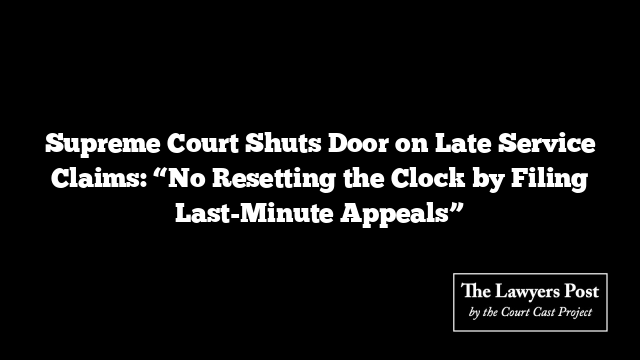In a sharp reminder to government employees, the Supreme Court ruled that once the clock runs out on a service dispute, it cannot be wound back simply by filing a delayed grievance. A belated representation, the Court said, doesn’t magically revive a dead claim.
The bench made it crystal clear: when a public servant is denied a benefit—especially one not communicated by formal order—the responsibility falls on them to act swiftly. A “representation” might be necessary to kickstart a challenge, but waiting years to raise one, the Court stressed, doesn’t put limitation periods on hold.
Addressing the nuances of administrative justice, the Court explained that even when the rules don’t expressly call for a representation, it becomes a practical necessity if a government employee feels shortchanged. But delay, it warned, can be fatal.
“What counts as a reasonable time will always depend on the facts,” the Court noted, underlining that an aggrieved employee must act before third-party rights are impacted—or at least within a reasonable window once aware of the deprivation. However, the Court emphasized that no matter how justified the grievance, dragging one’s feet for years and then tossing in a late application won’t trick the law into offering a second chance.
In this case, a Doordarshan employee, who had accepted career progression benefits under a newer scheme (MACP) back in 2010 and 2015 without protest, suddenly claimed in 2016 that she deserved the older, more generous ACP benefits instead. By then, the Court said, the ship had long sailed.
The Central Administrative Tribunal and the Karnataka High Court had earlier sided with the employee, but the Supreme Court wasn’t impressed. Highlighting that the respondent’s claim was filed way outside the allowed time, the top court slammed the door shut, reaffirming that “highly belated representations” don’t breathe new life into old grievances.
“The respondent should have approached the Tribunal immediately after her rights were allegedly infringed—not years later, after comfortably accepting the benefits under the MACP scheme,” the Court pointed out.
Still, showing a touch of mercy, the Court used its special powers under Article 142 of the Constitution to protect the retired employee from being forced to return the benefits already received, noting her retirement in 2018.





